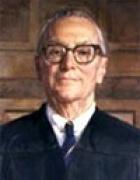A Tribute to the Honorable Charles S. Desmond

The following tribute to the honorable Charles s. Desmond was written by the former presiding justice of the appellate division, fourth department, the Honorable Michael Dillon. Sadly, Michael Dillon has passed away. Many of the things he praised Judge Desmond for were also true of Justice Dillon.
"This is my Law School," he would proudly proclaim each year as he lauded the performance of the finalists in the Moot Court Competition named in his honor. It was an obvious boast by Chief Judge Charles S. Desmond – intended to convey his satisfaction with the high quality of advocacy he had just witnessed. During the last decade of his life, I sat with the Chief as judge of that Competition. It was always clear that his respect for the institution was exceeded only by his genuine affection for its students.
It is one of the great joys of my life that I was privileged to share Judge Desmond's friendship. I first came to know him in 1952 when his younger brother, Edward, a distinguished lawyer, brought us together over lunch. There I was, a yearling in the practice of law, dining and chatting with an Associate Judge of the Court of Appeals. I was in awe of him then and I remained so for the next 35 years. To be in his company and to share conversation with him was a delightful experience.
This remarkable, unique man of four score and ten never grew old, even as his body gave way to the years. He was ever young and up to date, whether the subject be law, politics or other current events. He lived not in the past, except to apply its experience to the present and the future. He spoke often and reverently about his parents and the politics he learned from his father. He exuded paternal love when he spoke of his children and he reveled in the progress and accomplishments of his grandchildren. His love and affection for every member of his family was returned with abundance.
He suffered much tragedy in his lifetime, accepting all of it as part of God's plan. He lost his wife Helen after a beautiful 30 year marriage. He was stunned by the untimely and tragic death a few years ago of his only son Ryan, who bore Helen's surname. Ryan was an accomplished trial lawyer to whom, following his death, the Law School Alumni Association presented posthumously a special award. The Chief was there to accept and he said of Ryan: "He loved his family; he loved his Town of Eden; he loved his country; he loved his church; he loved the law and lawyers; and he was faithful to all." Those words were true of Ryan; they are equally true of Chief Judge Desmond.
From the moment he was called upon to deliver the commencement speech to his grade school graduating class it was clear that Charles S. Desmond would rise above his peers. When he began his service on the highest court of our State, he was the youngest person ever to sit on that honored bench. He was the first ever to serve as Chief Judge of the State of New York, and during his 26 year tenure, the Court of Appeals was often viewed as the finest common law court in the nation. That reputation was made and enhanced by the Chief as he consistently applied his belief, so often expressed, that "the dictates of common sense are compatible with the principles of common law."
Charles S. Desmond was, as the Buffalo News recently editorialized, "a judicial statesmen." He was a master in the use of words, insisting always upon precision of language – and particularly so in the art of opinion writing. Contemporary judges, especially those bent upon writing law review articles as decisional pieces, can learn much from a review of Judge Desmond's work. His opinions, more than 450 in number, are models of clarity and eloquent simplicity. He wrote exactly what he meant to say, sprinkled occasionally with just enough of the Latin to provide emphasis and to reflect his liberal arts Jesuit training. It was his firm and correct belief that the law should evolve on a case-by-case basis and that the court's role in that process was to decide the issue before it – and to do so in clear, unequivocal language.
It is never doubted that every word in a Desmond opinion was his, for he wrote precisely as he spoke – with poetic elegance. Many years ago he said of judges:
For better or worse, we have given our lives and such abilities as we have to furthering the great cause of justice… I think we are keepers of a dream for our time, one of the oldest, the best dreams of the human race, a dream that was old when the world was young, a dream that will never die, a dream of open courts dispensing equal justice, the dream of peace and good will through law.
Justice Desmond was committed to the rule of law, applied fairly and temperately to ensure equal justice for the meek as well as the mighty. This gentle man kept faith with the dream to which he was entrusted. He contributed mightily to the cause of peace and good will, and we would do well to pursue his example.